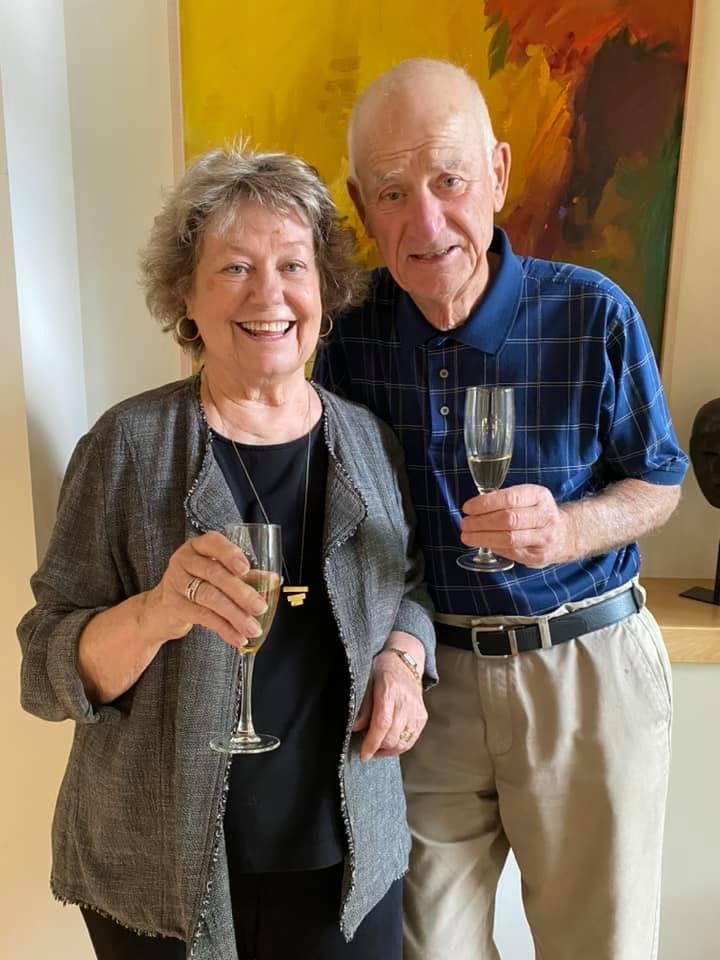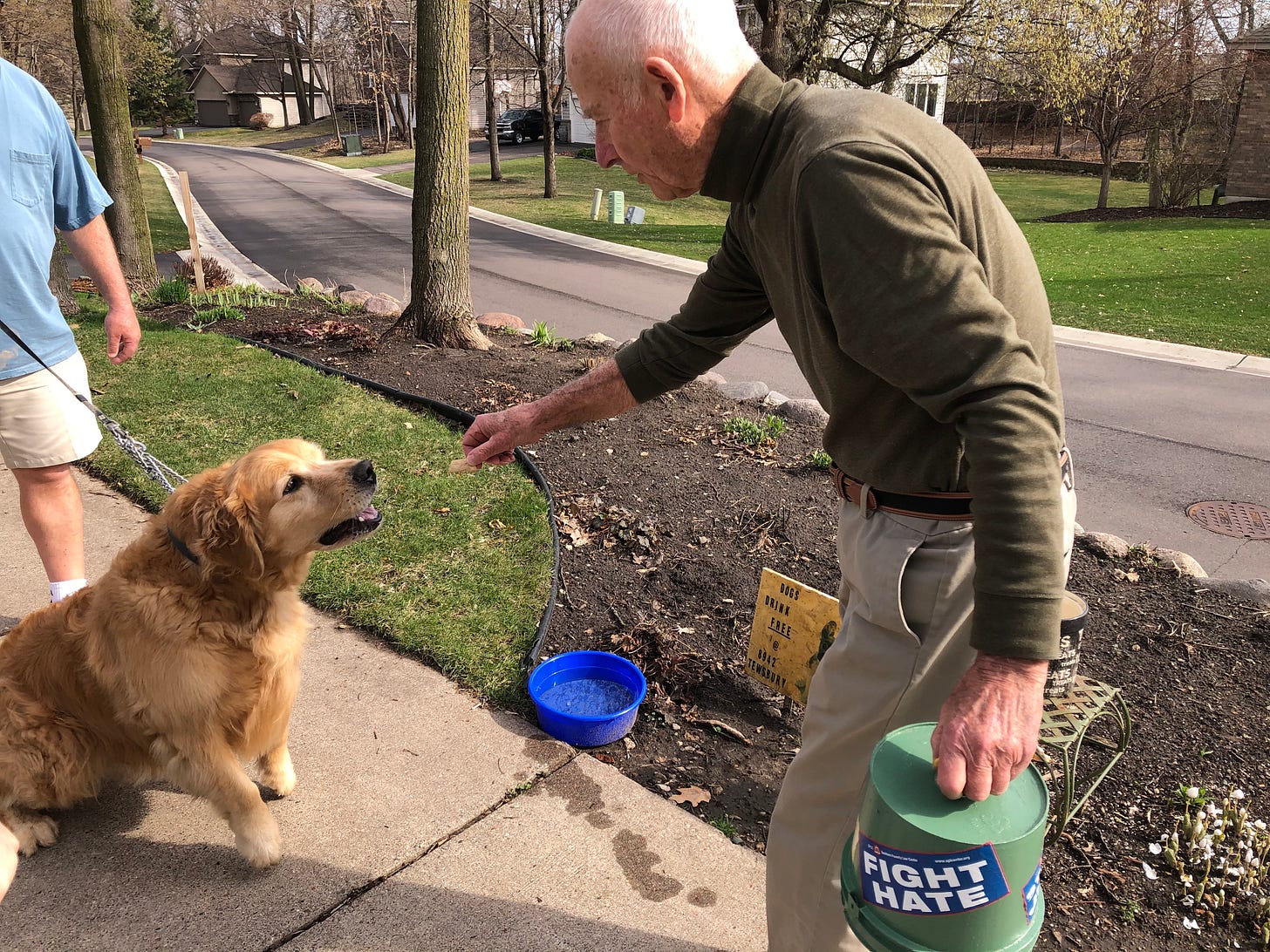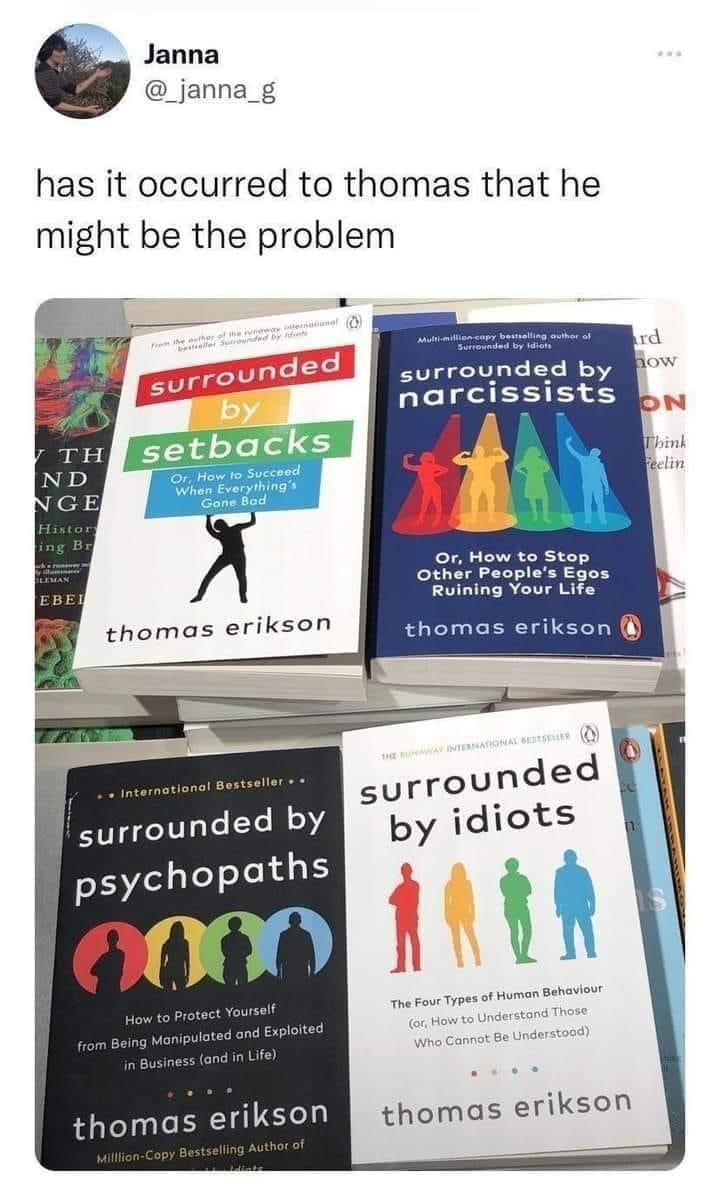Yeesh! Stop Pushing Polyamory on Us Already!
Instead, for Valentine's Day, a Lifelong Love Story
Polyamory has hit the elite New York media trifecta: In the past few months, several articles in the New Yorker and the New York Times have praised polyamory—often in punctiliously explicit detail. These articles argue that tomcatting around is an “adventure” that will help a woman “find herself.” They claim that open marriages are deeper and more honest than monogamous relationships. New York Magazine’s cover story this month offers “a practical guide to polyamory” and gives readers tips for how to set up our own polycules. Even staid old NPR wants to teach us how to “explore non-monogamy.” Truly, paeans to polyamory are ubiquitous right now.1
I have questions! For example, have we just given up? Have we decided that we are incapable of resisting the siren song of our hormones? Have we abandoned our responsibilities to each other in the pursuit of pleasure? One article lauds a “solo poly” man in high-minded terms—“he realized that he was at a point in his life when he wanted to focus more on himself than on someone else, but without losing the perks of romantic intimacy”—but isn’t he really just a player? And what about the kids? Seriously, what about them? Does their parents’ craving for drama and stimulation supersede their need for a stable home? Do poly parents not care that their kids will be skeeved out by their proclivities?2 And why is the elite media cheerleading for this lifestyle and trying to persuade us that it is cool, authentic, and enjoyable to be poly?3 Are they trying to wreck Valentine’s Day?
To clarify, of course we should not return to the days of The Scarlet Letter, when divorce was impossible and communities harshly punished those who transgressed the marital bond. Divorce is a necessity for people in abusive or unhappy marriages, and consenting adults4 ought to be free to engage in whatever practices they choose.
But that doesn’t mean we have to celebrate polyamory. If we must discuss it, perhaps we should treat the practice the same way we do other private predilections that skirt ethical boundaries. Polyamory reminds me of people who believe they are transgressive, high-status, and in-the-know because they eat cruel foods like foie gras and ortolan; take this scene from Succession, in which Tom is “trying to seduce” Greg5 by feeding him an ortolan. Order the ortolans, assemble your polycules, open your marriage. Knock yourself out. But please stop pestering the rest of us to admire and emulate you!
A Lifelong Love Story
Readers, I refuse to succumb to despair, which is why I’d like to speak up for another way. Meet my parents, who celebrated their sixtieth anniversary a few months ago.
To counterbalance the unmarried marriage counselors who are promoting polyamory in the media, I thought it would be helpful to hear from some actual experts on successful relationships, and my parents graciously agreed to answer some questions for this post.
Happy Wanderer: Thank you so much for letting me interview you! How did you meet?
Mom: It was at a meeting for new-to-the-district teachers at the junior high where we both taught in 1961. I thought Dad looked pretty good!
What made you realize that you wanted to spend your lives together?
Mom: We had common interests.
Dad: We took frequent long evening walks in courtship.
Both: We allowed time for our relationship to develop. And we loved each other!
What in your opinion makes for a successful long marriage? Do you have any tips for us?
Mom: Make a good choice, hang in there, speak up, have good friends, have fun together, have an active social life with friends who are couples, have friends you do things with independently, and travel.
Dad: You realize that you are lucky to have your mate want you!
What do you especially love and admire about each other?
Mom: He’s fun to be with, and kind and non-judgmental. He uses his creativity for kindness and fun (for example, he has set up a dog-treat station outside for the many dogs who walk past, and he gives out ice cream on the last day of school to all the neighborhood kids). He is also a good traveling companion and can fix anything!
Dad: Her acceptance of others. She is always looking for the good in others and is willing to forgive.
In any marriage there will be difficult times. What has helped you to face challenges and to come out the other side stronger?
Mom: Even though it’s hard, when a challenge occurs, it’s important to talk it over calmly, listening to your partner as well as presenting your own views. Sometimes this can take more than one session, and it may take time for each person to internalize the ideas discussed.
Dad: My wife is always willing to discuss the issues in a non-threatening and calm way, which leads the way to solving an issue. And we never, ever say something in anger that would leave lasting scars.
My parents’ secret is actually pretty simple and accessible to all of us. It all comes down to how we spend our most precious and finite resource, time. Happy couples
Make time to be together as a couple. Every day when my dad got home from work, he and my mom would retreat to their room, where he changed into comfortable clothes and they chatted about their days. My brother and I knew not to bug them; that time to decompress and to reconnect as a couple was sacrosanct. Nowadays, my parents drink their coffee together by the front window every morning. My mom delivers what she refers to, adorably, as the Internet Report (on the weather, headlines, and social media posts from friends and family), and they wave to their neighbors as they walk past.
Spend time with other couples. My parents have many decades-long friendships with other couples. Their gourmet club has met every month or so for about fifty years, the couples travel together a few times a year, and they meet up to play cards at least twice a week.
Take time apart with their own friends. Weather permitting, my 91-year-old dad will be found on the golf course with friends. Meanwhile, my mom belongs to four (!) book clubs. Time apart is important: Neither of my parents is the other’s only emotional support or companion for activities.
Give their time to others as volunteers. My parents are regular volunteers at their church and in the community. They have also gone on a number of international service trips, including several trips to India, where my mom used to train special-education teachers.
Oh, and also:
My parents don’t waste time scrolling on their phones.
The Selfish Case for Honoring Our Commitments
My parents’ experience shows that a lifelong monogamous love story helps us to become our best selves—and to have a wonderful time in the process. In my opinion, our culture overemphasizes the view that relationships are hard work. We don’t often hear about the joys, the comforts, the learning, and the fun in longterm relationships. So let’s talk more about the good stuff!
True, a poly paramour provides novelty, but s/he won’t throw you a surprise party to celebrate your fiftieth birthday; burst into the living room to share a joke; tackle the dryer vent and the stinky drains so you don’t have to; race around the backyard playing goofy games with you and the kids; shoot you a little smile when your kids say something adorable; join you in your pride as your kids grow into adulthood; give you a long hug after a brutal session at the dentist; take your side and talk you through a career setback; work out a plan with you for meeting family budget challenges; grieve with you after the death of a loved one; sit with you as you confront a health crisis; or bring you your basset hound mug to cheer you up in the hospital. It is irresponsible of the elite media to encourage us to sacrifice these meaningful pleasures for a chance at some quick, trendy thrills.
A letter to the editor of the New Yorker, written by a woman who tried polyamory and found it wanting, makes the case for a better way:
I had never felt true loneliness until I was added to the roster of a weekly calendar designed by the central couple. . . .
I have come to think that marriage, like life itself, is both short and long, often thrilling and sometimes tedious. But what richer, sexier, more creative challenge exists than that of devoting oneself to lifelong partnership with another person?
Feeding the Good Wolf
Perhaps I am being uncharitable in calling the elite media irresponsible. The polyamory cheerleaders are young, and they may not have personal experience with successful committed relationships. They may believe that they are doing their audience a favor when they denigrate commitment and encourage us to seek constant variety. Or they may be unwittingly espousing what Rob Henderson calls luxury beliefs—“ideas and opinions that confer status on the upper class, while inflicting costs on the lower class.” Polyamory does seem to work for some rich, rationalist, childless young people in the Bay Area. Which, whatever. You do you, tech bros!
But, as a friend puts it, “money and social status can paper over some of the problems with unconventional social structures, and it’s unfair and harmful to advocate for those same structures for people who don’t have the same privileges.” The truth is that most of us aren’t multimillionaires, and none of us will be young forever. When opportunities to fulfill the desire for constant variety become thin on the ground, life can get pretty lonely and empty. For most of us, polyamory would be a maladaptive response to a problem we all face—that, to paraphrase John Berryman, “Life, friends, can get boring at times.” Those of us who know the happiness and fulfillment of a lifelong love story need to start using our influence for good. By simply calling attention to those beautiful moments of love and commitment around us, we can exert positive peer pressure—we can feed the good wolf. For example, last year, my parents’ neighbors left this valentine on their driveway for them:
Or the other day, my husband and I leashed up our dog and set out for the local bakery. A friend spotted us from her window and texted me to say that we looked very cute holding hands as we walked. More of this, please!
It is not a law of the universe that life will be full of intoxication, titillation, stimulation—and free of discomfort, dissatisfaction, disappointment. Sometimes life is hard, we don’t get our way, or we sit mired in the doldrums wondering, “Is this all there is?” We may be tempted by the shiny object over there on the next bar stool, or believe that all our problems will be solved if we just find that perfect person or experience, and to hell with all that is good in our lives right now. But maybe the fault is not in our stars, but ourselves.
We have power to be true friends and to advocate for authenticity and deeper meaning in all of our lives. When our loved ones are having a tough time, we can help pull them out of their ruminations over annoyances and disillusionments. We can invite them over for coffee or out for a walk, or round up a group to volunteer at a food pantry or to sing at a nursing home. So let’s start! Let’s support each other in becoming the best, most generous, responsible, and loving people we can be. Let’s help each other write our lifelong love stories.
How about you, readers? How do you feel about all this polyamory talk in the media right now? Are you intrigued? Or repelled? Do you have a lifelong love story? Please share your thoughts in the comments!
The Tidbit
Apropos this post, my friend Natalie posted this video recently, and I just had to share it. Tee hee!
Hashtag not all elite media. I was gratified to see Tyler Austin Harper’s review of More: A Memoir of an Open Marriage, by Molly Rosen Winter, in the Atlantic. As Harper notes,
Molly’s polyamorous journey toward self-actualization does not seem to bring her much happiness. It seems to make her miserable, while taking her attention away from the real issues. . . . Her attempt at finding a “deeper truth” through sexual enlightenment not only provides little truth or enlightenment; it keeps her from seeing her problems clearly.
Polyamorists make a great merit of their honesty and openness, but the presence of kids complicates this ethic. If poly parents don’t want their kids to be skeeved out by inappropriate exposure to outré adult sexual practices, then they must lie continually to them. There is no virtuous way to navigate between this particular Scylla and Charybdis.
That’s the part I don’t get. As the joke goes, polyamory is for people who really enjoy sheets—in the Excel as well as the bedroom sense. So much organizing, strategizing, and debriefing! Such a buzz-kill!
Although I’m not persuaded that all poly arrangements are consensual. How many spouses submit to open marriages in the desperate hope of forestalling a divorce? How many young people submit to joining a polycule because they haven’t found anyone who is willing to commit to the monogamous relationship they truly want?
For those unfamiliar with the show, Tom is not actually trying to seduce Greg here, although there is an amusing video, h/t my friend Ed, that implies that Tom and Greg are Succession’s One True Pairing:









I wish that in 20 years the journalists writing these vapid paeans to polyamory would check back in on their subjects. They won’t of course. But I wish they would.
Such a wonderful read! The pictures warm my heart too. Thank you from an old married lady who would not have it any other way!